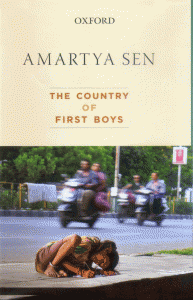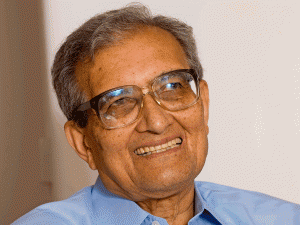Amartya Sen Book Review
By Ghazi Salahuddin | Books | Published 8 years ago
Though I know my Amartya Sen reasonably well, this collection of essays by the most endearing public intellectual of South Asia has revealed to me some new facets of his personality and passions. Here is further evidence of the Nobel Prize-winning economist’s grasp of literature and the arts. One is touched by his devotion to Sanskrit and how he discovered in this priestly language “a larger body of firmly agnostic and atheistic literature … than any other classical language in the world.”
And it would be natural for someone like him to be deeply moved by “the reliably agnostic Gautama Buddha and his teachings.” Amartya Sen, after all, is a humanist. We are familiar with his work on famine, poverty, justice, identity, deprivation and education. These essays, most of which were published in The Little Magazine from the year 2000 to 2009, have seeds of his major works. We also have the speech he delivered at the Jaipur Literature Festival as recently as 2014.
But the pick of the collection for me is the introduction penned by Amartya for this edition. It is longer than any of the 13 essays and it is revealingly titled ‘The Personal and the Social.’ He has explained how the essays, written over a decade-and-a half, project “a unity of approach.”
He recounts how he was forced to reflect on his life and his work when the Nobel Foundation asked him to give them two objects for the Nobel Museum that were closely associated with his work. “After some dithering on which object to choose, I gave the Nobel Museum a copy of Aryabhatiya (one of the great Sanskrit classics on mathematics from AD 499) from which I had benefited so much, and my old bicycle which had been with me from my school days.”
Why the bike? It is interesting how Amartya’s explanation records the foundation of his life’s work and his methodology. “I had used the bike not only to collect data on wages and prices from fairly inaccessible places, like old farm sheds and warehouses, for studying the Bengal famine of 1943, but also for trips to Santiniketan’s neighbouring villages to weigh boys and girls up to the age of 5, to examine gender discrimination and the gradual emergence of the relative deprivation of girls.”
Amartya’s area of interest, of course, is India. His focus is mainly the deprivation and social injustice that prevails in a country that has otherwise moved ahead in some respects. But his research and analyses are very relevant for Pakistan. Indeed, we may transpose the narrative to Pakistan — with a few adjustments. We are two unhappy societies that are so alike.
Let me begin with the title essay, ‘The Country of First Boys.’ The photograph for the caption on the cover, so to say, is that of a street girl, crouched on the pavement, engrossed in writing on a sheet of paper. What does it make you think about the theme of the book — or the essay? The easy guess is that it is about gender discrimination in education. The scene also underlines poverty.
But it is not exactly about gender. Education, yes. And that too of the boys of the privileged class. Amartya detects a bit of a mystery in the fact that though Indian education is poor and deficient in its coverage and quality, it still receives “spectacular acclaim from abroad.” Highly educated and well-trained Indian experts are taking away good jobs in the States and in other countries. Indians are “in leading positions in western academia, management, administration, literature, medical practice, engineering, and scientific and technological research.”
These Indians are the `first boys’ (and some girls) who mostly come from the elite class. But how does this resplendent picture sit with the huge mess that is Indian education? “The answer, I am afraid, is that it sits there very comfortably, and what is worse, sits snugly in a very stable way. At every level, Indian education is obsessed with the first boys. In the classroom, in society and in the making of public policy.”
Amartya asserts that the ‘first boy syndrome’ is big in India. But when it takes over an educational system, “there are reasons to be seriously alarmed.” The focus is narrow and public policy concentrates “on looking after those blessed with opportunity and success.” Meanwhile, the last boys and particularly the last girls can’t even read. Amartya’s argument is that India loses so much through its extraordinary concentration on first boys.
We know that basic education is a fundamental human right. Amartya has elucidated the various deprivations that the violation of this right generates. He shows how the neglect of basic education of a large section of the Indian population causes many economic, social, and political adversities.
Identity is one subject that Amartya has delved deeply in. His essay on this theme — ‘The Smallness Thrust Upon Us’ — has drawn on his address at the College de France in Paris in 2001. Hence, it preceded the publication of Amartya’s seminal book, Identity and Violence: the Illusion of Destiny.
I will restrict myself to citing two quotations that Amartya has used in this essay. He begins with Peter Sellers, who said in an interview: “There used to be a me, but I had it surgically removed.” The other is by Ogden Nash: “Any kiddie in school can love like a fool. But hating, my boy, is an art.”
The point here is that many contemporary political and social issues revolve around conflicting claims of disparate identities. While a sense of identity can be a source of pride, it can also be the basis of hostility and violence. We all have multiple identities. Emphasis on one particular identity in a given situation can create problems.
“We have reason enough to grasp the fact that people in India or Pakistan are not just citizens of these respective countries, but also human beings,” states Amartya, “who can view each other as other human beings. We are not obliged to interrelate with each other only through our respective states or governments.” What Amartya is actually saying is that “we have to resist smallness being thrust upon us.”
It should be possible for me to peer into seven or eight of the 13 essays to create a montage of Amartya’s passionate though reasoned and meticulously researched advocacy for equality, justice and empowerment of the oppressed people. But space is a constraint. So let me go for two more essays, one of which I intend to bring up in some detail.
As an aside, I somehow thought of Bertrand Russell when I was reading these essays — and mainly in remembrance of the haunting opening of Russell’s autobiography. This is how the loveable philosopher/activist of the twentieth century began the story of his life: “Three passions, simple but overwhelmingly strong, have governed my life. The longing for love, the search for knowledge, and unbearable pity for the suffering of mankind.” These words could also illustrate the life of Amartya Sen — in addition to economics, he has also been teaching philosophy at Harvard.
To underline this affiliation, let me first briefly refer to his essay on Professor Hiren Mukerjee, based on a lecture on ‘Demands of Social Justice’ that Amartya delivered in the Central Hall of the Indian Parliament in August 2008. Mukerjee represented the Communist Party of India in the parliament from 1952 to 1977 and was a liberal scholar who rejected ideological sectarianism in Indian politics.
It is the title of the essay in the book that stands out. It is: ‘What Should Keep Us Awake at Night.’ It is interesting that Amartya has eulogised Mukerjee, with whom he also shared a “passion for Sanskrit and love of books in general,” against the backdrop of the wide prevalence of inequity and injustice in India. This in spite of India’s rapid economic progress. He concludes the essay with an emphasis on the need for identifying priorities to enhance human lives and enforce justice. He says: “A good first step is to think more clearly — and far more often — about what should really keep us awake at night.”
Finally, the essay that is actually the text of the speech he delivered at the Jaipur Literature Festival in January 2014. Here, Amartya has valiantly ventured into the realm of fiction, resorting to a kind of magical realism. But the issues he raises are rooted in his philosophy. I have referred to his interest in literature and some of the references in this collection indicate his deep study of literature.
Anyhow, the JLF speech is essentially his encounter — or conversation — with the Goddess of Medium Things (GMT). The title — ‘A Wish a Day for a Week’ — reveals the plot. Yes, he has to make seven wishes that the goddess would fulfil, though she is quite combative as well as cynical. Obviously, the wishes have to be consonant with the spirit and objectives of a literary festival.
So I conclude by paraphrasing those wishes. One, a greater role of humanities in Indian education. The second is a political wish: to have a strong and flourishing right-wing political party that is secular and not communal. The goddess understands why a leftist would make this wish.
Continuing with politics, the third wish is: “I would like the parties of the left to be stronger, but also more clear-headed and much more concentrated on removing severe deprivations of the really poor and downtrodden people of India.”
On to media, in the fourth wish: “I would like the media to be more responsive to the needs of the poorest people, and less single-minded in their coverage of the world of glitzy entertainment and shining business opportunities.”
“My fifth wish is easy to speak about,” he tells the goddess, “since it concerns persistent deprivations I have been nagging about for decades: all children must have decent schools to go to; every person must have medical care; women should not have to lead more deprived lives than men …” and so on.
The sixth wish concerns a judicial decision in India which recriminalised homosexual personal behaviour. But the goddess wonders if she could persuade the Supreme Court to think again. And the last wish? “I wish we in India will recognise our strength because of the nature of the country as well as the opportunities given by Indian democracy….” Can the goddess help in making India less defeatist?
Well, the goddess makes some
remarks and insists that “you must
read more books.” Including, she may have added, books written by Amartya Sen.
Ghazi Salahuddin is a respected senior journalist in Pakistan. He currently works with the daily The News and the Geo television network.




